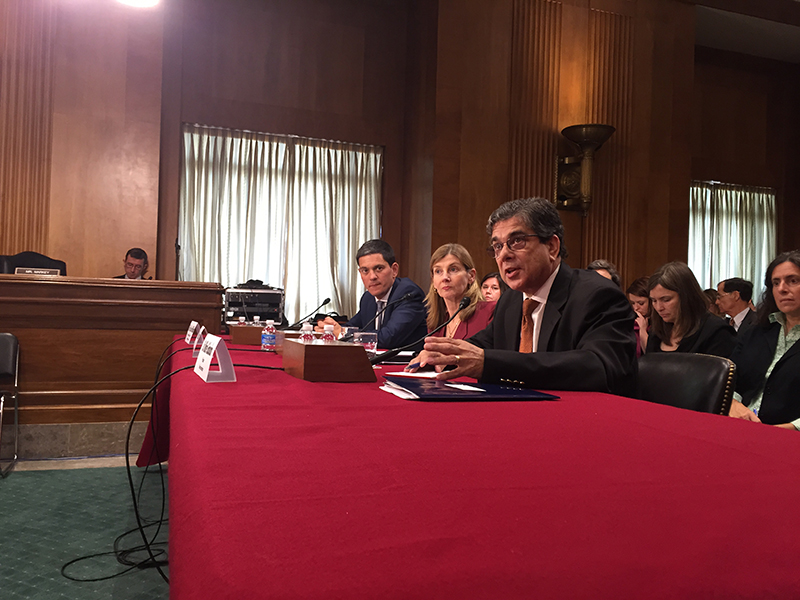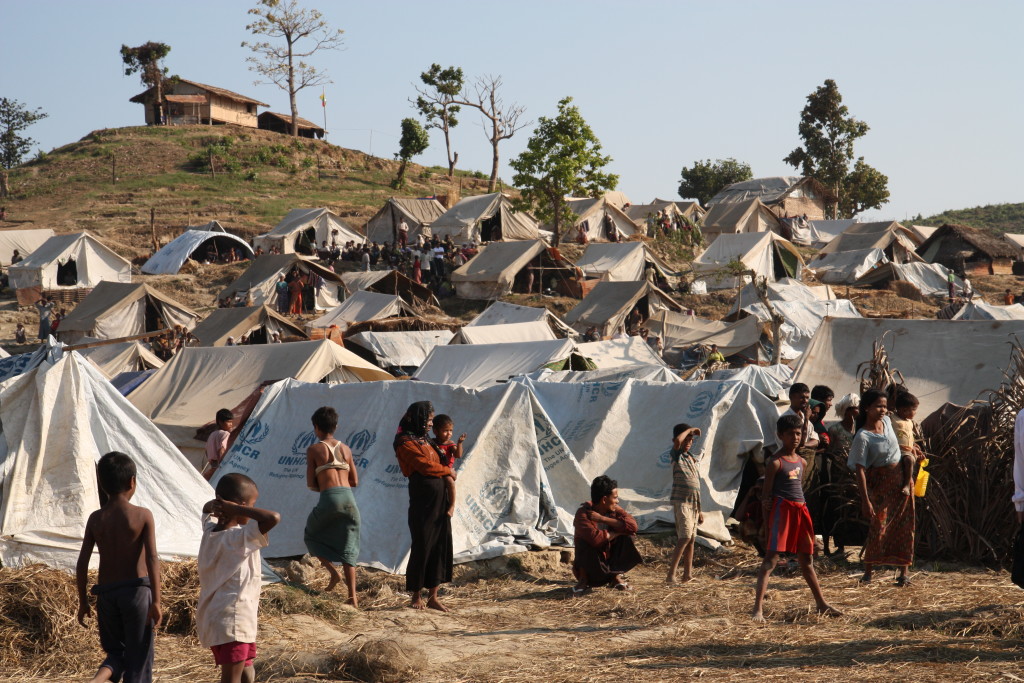WASHINGTON – Nearly four million Syrians have weathered the storms of political instability and violence by fleeing their country and pleading for sanctuary and official recognition as refugees in neighboring states – and far beyond.
The United Nations High Commissioner for Refugees is responsible for leading and coordinating international action to protect refugees and resolve refugee problems worldwide. It “for the end of violence, for accountability, [an] end to impunity. Because failing this, those responsible for human rights violations and crimes are emboldened,” said Karen AbuZayd, former United Nations Under Secretary-General and UN commissioner of the Inquiry on Syria.
“The war will go on leaving more destruction. It will destroy lives, destroy society, destroy institutions including education, and it will destroy culture and heritage in its wake,” Abuzayd said in a Middle East Policy Council panel on April 21, 2015.
As the civil conflict treads into its fifth year, half of Syria’s pre-war population has been displaced, according to data compiled by the United Nations. In addition to those who have fled the country, more than 220,000 civilians have been killed, 6.5 million are internally displaced and more than 12.2 million civilians in the Syrian Arab Republic are in need of humanitarian assistance. Syria is in a state of crisis, and it is spreading throughout the region.
Twenty-five percent of Lebanon’s total population is Syrian refugees. The United Kingdom of Great Britain and Northern Ireland has only accepted 143 Syrian refugees, according to a May 2015 UNHCR report. Neighboring countries such as Lebanon, Jordan and Turkey are sheltering millions of refugees. Turkey alone is harboring 1.7 million refugees.
The UNHCR has so far submitted 12,140 Syrian refugees to the U.S. for resettlement consideration as of May 2015. After resettling only 105 refugees in 2014, the United States has accepted 651 refugees as of April 2015, according to a State Department refugee admissions report.
State Department officials released a statement that the president of Syria, Bashar al-Assad, “violently suppressed expressions of popular dissent” and his sustained reign only incited extremism and instability, according to a State Department September 2014 press release. Ever since he assumed office in July 2000, his country entered the Syrian Civil War and he has been accused of crimes against humanity by the United Nations.
The United Nations has identified and is investigating the Assad government for violations of human rights under international law. The UNHCR has submitted numerous reports that multiple agents have explicitly targeted civilians – including the Assad regime, terrorist groups, anti-government armed groups and extremists. Since last year, Syria has been criticized for silencing journalists and activists, and committing other violations of international law.
Since Syria first established relations with the United States in 1944, the relationship has been precarious at best. Syria has been identified as a state sponsor of terrorism since 1979 because of its support for various terrorist organizations, such as Hezbollah.
In order to counter that kind of activity, the Obama administration has slapped economic sanctions against Syria, and taken steps to eliminate its chemical weapons stockpile.
The Organization for the Prohibition of Chemical Weapons (OPCW) and the international community established a legal framework to eliminate Syria’s chemical weapons, which were used by the Assad regime to attack Damascus suburbs on August 21, 2013.
The unrest from the Syrian uprising, in early 2011, spawned a full-fledged civil war, which increasing armed conflict between the Assad government and insurgents trying to displace it. According to the latest U.N. report, those fighting Assad now include proliferating terrorist groups like Jabhat Al-Nusra and ISIS, which have gained traction through tactics such as public executions, torture, disappearances and mutilation.
The infighting between so many groups that are unfriendly to the United States, including terrorist groups and the Assad regime, have made it more complicated for Washington to intervene. But some Syria watchers say any kind of intervention is better than the current U.S. position, which is to mostly watch from the sidelines.
“We need to plant the American flag among other flags around the world and say this issue is important, and we need to mobilize all of these resources and move on it now,” said Denis Sullivan, director of the Boston Consortium for Arab Region Studies. “That means dealing with a bizarre cast of characters,” he said, including the EU, Russia, Iran, Saudi Arabia and Qatar. He urged global leaders to come to the table for diplomatic negotiations.
However, the United States has not furthered negotiations or drawn up a comprehensive legal framework to persevere in addressing the Syrian crisis, albeit providing $2.9 billion in monetary assistance as of September 2014.
“It’s the political overlay- it’s the political solution- it’s the parties who have a political interest in the region who are the ones who in the end come together to affect some sort of result,” said Ford Fraker, former U.S. ambassador to Saudi Arabia and president of the Middle East Policy Council, in a Q & A session at the panel.
The lack of U.S. progress toward pursuing a functional political solution in Syria is due to other issues on the White House’s agenda, principally the U.S.-Iran nuclear agreement, Fraker said. He said that the Iran nuclear talks have “prevented any useful dialogue happening between the United States and Iran on any kind of Syrian solution.”
But, is it our job to intervene, and deploy U.S. troops to fight for people they’ve never met? Is the United States supposed to be the world’s police force, flashing its badge to save the day? Does the deterioration of the lives of 17 million people affect the United States and international affairs?
AbuZayd appealed at a Capitol Hill conference demanding enforcement of international law, referral of the Syrian plight to the International Criminal Court, reformation of the national justice system, the halt of child recruitment for terrorism, increased foreign assistance and establishment of regional tribunals.
Humanitarian aid may only function as a tattered band-aid to Syria’s perpetual conflict, instead of an enduring political solution. “Will Syria’s displaced be condemned to relief instead of progress?” asked Sara Roy, a research fellow at the Center for Middle Eastern Studies at Harvard University.
“The issues to track are the political ones,” Fraker said. “Until you see certain events having occurred that will allow the principal actors then to turn their attention to Syria, you won’t see any progress there.”







